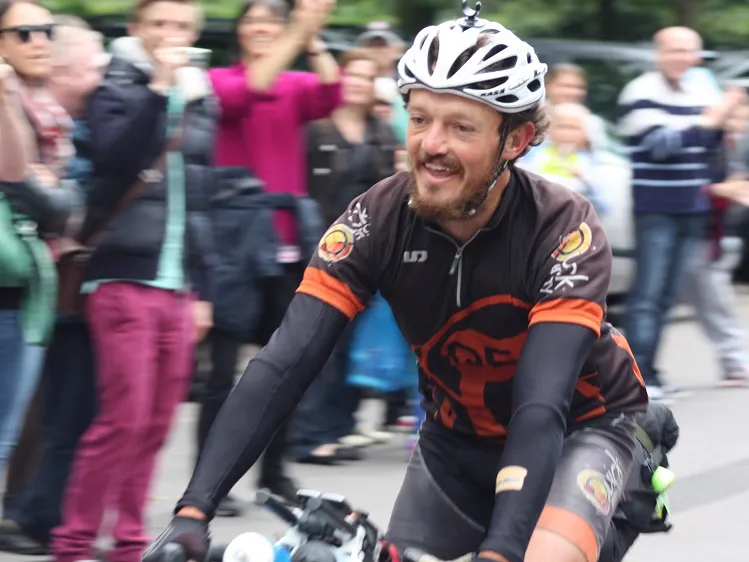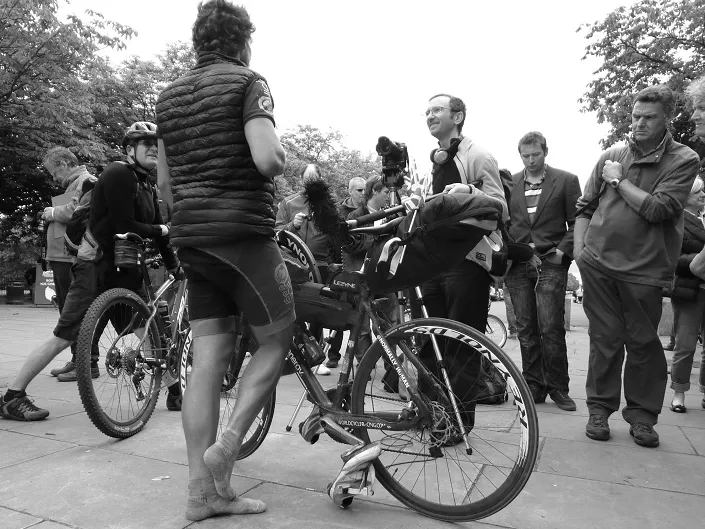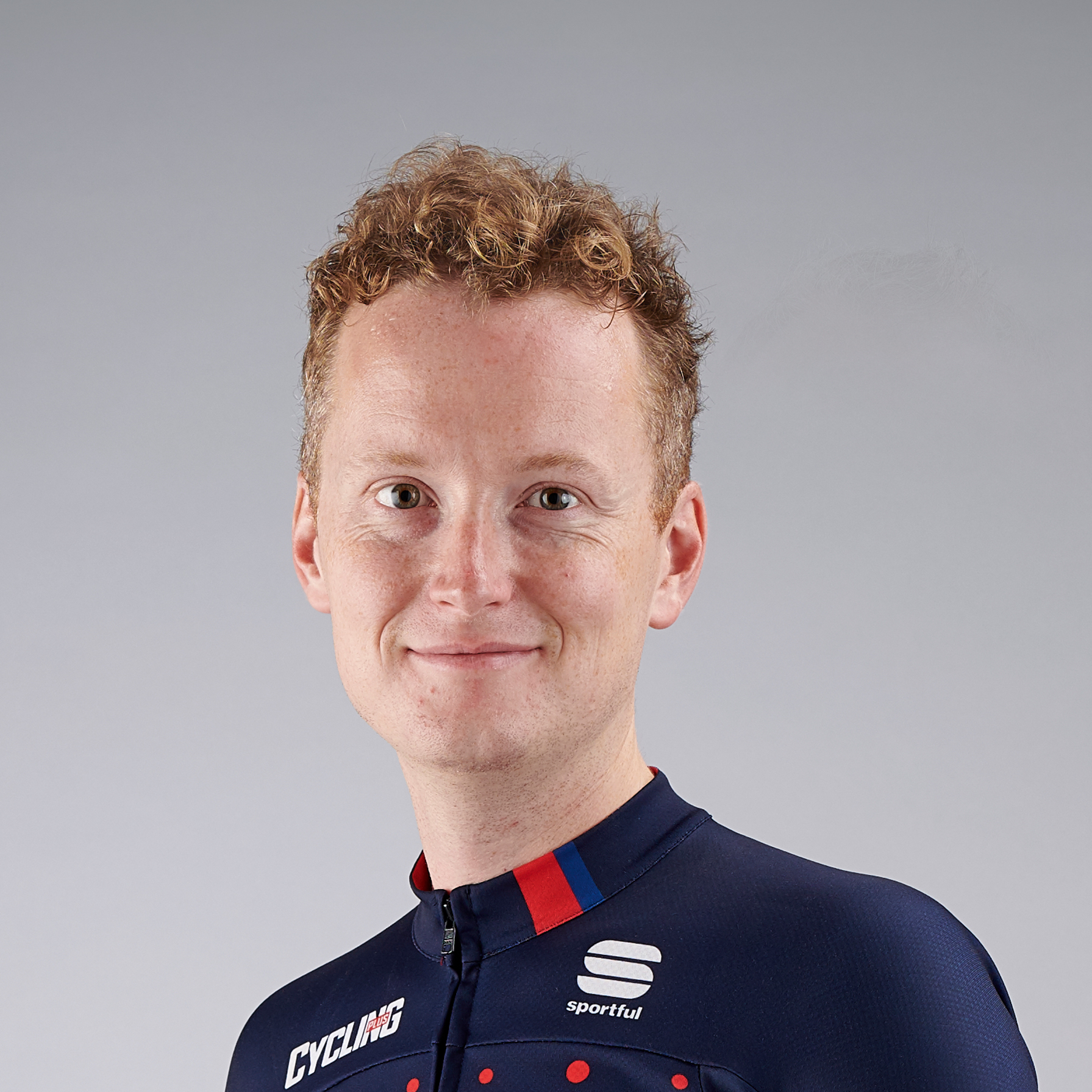"I've just had a friend over to knock me back into shape," said Mike Hall, when BikeRadar spoke to him earlier this week. "He reckoned I was in pretty good nick – just a few bits and pieces were out of place."
These aren't the words of a man who's getting over a tough weekend's racing, but one who arrived back in England last Monday after cycling 18,175 miles around the world. And he did it unsupported in a mind-bogglingly rapid 91 days and 18 hours.
Putting it into perspective, it's a fraction under 200 miles a day, every day, for more than three months. The thought of covering that distance for just a single day petrifies us. Anyone who can keep it up for that length of time, with the associated sleep deprivation, mental and physical fatigue and torrid weather, as well as unfamiliar terrain and cultures, deserves serious respect.
Hall was one of nine competitors who departed from Greenwich in February for the World Cycle Racing Grand Tour, a bike race with two targets. The first was to win by beating everyone else back to London after a dash around the planet. The second, more prestigious aim was to beat the 106-day record held by Britain's Alan Bate. Striving for the first, the theory suggested, would help lead to the second.
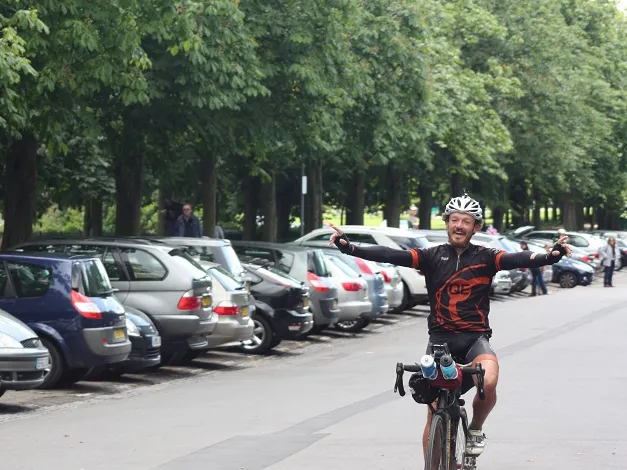
Hall said he "would have been happy to roll over the finish line, have a cup of tea and go home"
We spoke to many of those taking part prior to departure and it was clear that only a handful had the right shape and mindset to topple Bate. Some were content to break Vin Cox's 'unsupported' record of 163 days (Bate received support at various junctures) while others were happy to be part of a once-in-a-lifetime adventure, soaking up their surroundings rather than relentlessly pursuing a record.
Hall, however, was fully focused on beating 106 days, even though he would be riding unsupported. "The winner will be the guy who lives fast, not necessarily the one who rides fast," he told us back in February.
He was nothing if not true to his word, as one of his typical days on the road shows. Up at 5am, he'd pack the tent that he spent the majority of nights sleeping in and be on the road at least an hour later. It would then be a case of finding breakfast, which sometimes came easy but sometimes didn't. One morning he rode 30 miles before eating, the emptiness in his legs being an experience he described as "hell".
After that, he liked to top 100 miles by 3pm, have lunch and fit in another century before bed. He rarely stopped before 10pm, and often not before midnight. On more than one occasion he rode through the night until 4am, had a couple of hours sleep until the sun came up and hit the road again.
With only four or five hours to sleep, nodding off was "ridiculously easy" for someone who admits to finding sleeping a challenge in real life. Often, he'd be texting friends and family when he'd drop off, only to awake in the morning with his phone still in his hand.
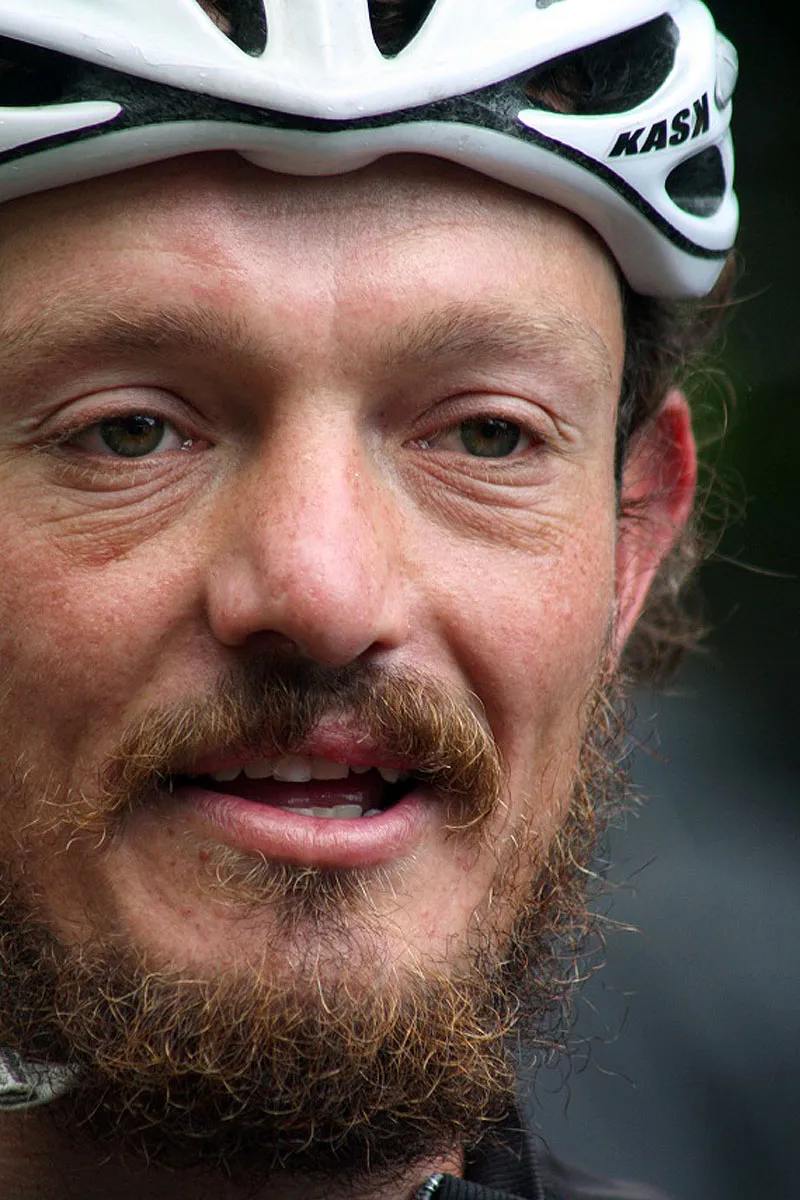
Despite a diet of cereal and energy bars, Hall would always try to get two sit-down meals every day
Burning so many calories each day, food became a big focus, and it was the psychological aspect of Hall's cravings that were a major obstacle. Having 100 miles to travel before his next food stop and not knowing what to expect when he got there meant he often found it hard to satisfy cravings.
If he wasn't satisfied, he said, he never felt prepared for the next section, because the food hadn't met his needs. If he'd thought about nothing other than apple pie for five hours and the only restaurant for miles was out of it, his desire for the pudding would go "ballistic" and hamper him for the rest of the day.
Life in the fast lane
Sticking to his mantra of "living fast", Hall said he never lacked motivation to get up each morning and grind out another 200 miles, because he knew from early on that the record was in sight. As long as he kept his averages up each day, it would take care of itself. Living fast meant not wasting time at breakfast, staring at your feet or looking down at the bottom of a coffee cup.
"You do end up sitting there wanting to do nothing, but it was a luxury I couldn't afford. You can lose half an hour doing it but you've just got to snap back to it."
Not that he found it easy – far from it. "When you take all those little moments out of your day idly doing nothing, it creates a lot of stress. Those little moments can give a sense of normality."
He certainly looked stressed in April, in a video he posted to YouTube. He'd picked up an illness in Australia that had thrown a spanner in the works, and the footage showed a man on the edge. He refused to take a rest, saying that the "guilt" of not moving forward would have been too much to bear.
"Stopping would have killed me," he said. "It would have felt like giving up. At least by moving I felt like I was making progress."
He battled on until New Zealand, where a meeting with fellow WCR competitor Richard Dunnett raised morale. The GPS trackers they all carried showed they were set to bump into each other, cycling in opposite directions, near Christchurch. On the day they would meet they were 100 miles apart in the morning and, demonstrating the grit and determination he'd shown thus far, Hall thought he'd try to beat Dunnett to the 50-mile crossover point.
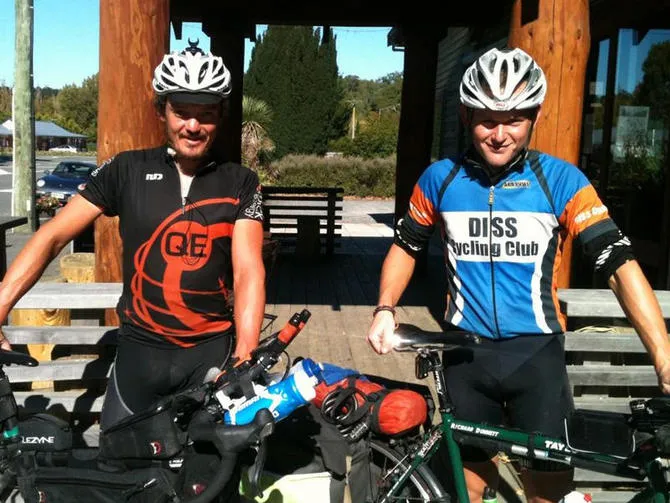
Mike Hall and Richard Dunnett pose for the camera in New Zealand in April
He succeeded, and 55 miles along he reached the town of Cheviot, though there was still no sign of his rival. He hung around as long as he could before leaving, but just as he crested the first hill out of town, Dunnett appeared on the horizon. Coffee and a chin wag was on the agenda, but turning back and heading down into the village went against everything Hall had built his race around. It was a choice he stands by, however.
"As long as you make the decision [to turn back] quickly, it doesn't have a negative effect," he said. "If you procrastinate you'll lose time, but if you make a decision, you stick by it. Even if it's the wrong one, make it quickly."
Gearing up
No matter what your physical capabilities, choosing the equipment for a race like this will make or break your chances. Hall has been involved in the bike industry for many years, and as an experienced tester he was in the perfect position to make the correct calls.
For his frame he decided it had to be carbon, which he believed would stand up to the rigours of 18,000 miles better than other materials, with the weight advantage on top. He wanted a cyclo-cross frame (the On-One Dirty Disco, rebranded with his Quick Energy sponsorship logos) because it would essentially be a stronger version of a road frame that could cope with any off-road excursions he might be forced into.
He went for Reynolds wheels (32-spoke hubs, custom drilled, for extra durability) with a deepish carbon rim that would offer an aero advantage. Because he had carbon rims and brake tracks, he went for disc brakes – he felt a calliper brake would wear through the track long before the race was over.
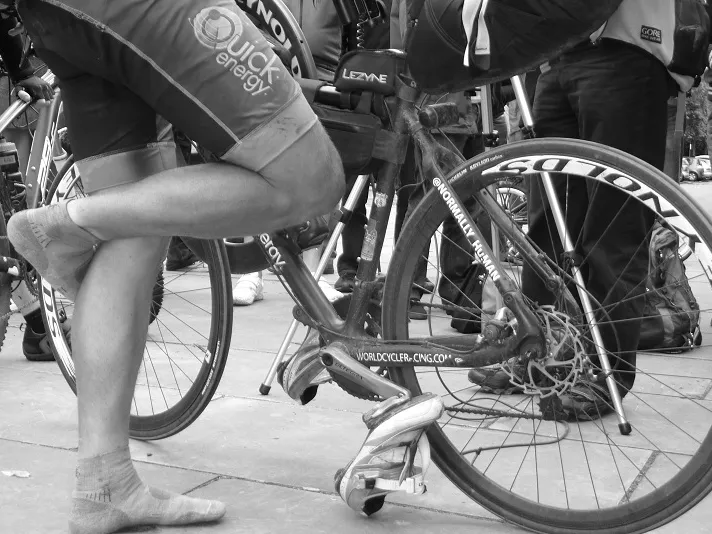
Despite rocking the Grizzly Adams look on his arrival back in London, Hall always found time to shave his legs
Hall briefly considered a gear hub but eventually went with derailleur gears (Shimano Ultegra groupset) because he got wind that a few of his rivals were doing the same. It was a decision made predominantly from a psychological standpoint and not wanting to push a hub gear round and feel the drag knowing that others had derailleur gears. He was happy as long as he knew others were in the same boat as him, and it seems he wasn't alone.
"When I met Richard in New Zealand, the first thing he did was pick my bike up," Hall said. "He was relieved when he found out it wasn't as light as he'd thought. He'd spent months thinking I was on a ridiculously light bike!"
His tyres, Michelin Krylion Carbons ("fast, comfortable, hard wearing"), were the same throughout the race. They took him all the way to Ankara, Turkey, before the rear one needed replacing – it's a distance Hall says was way beyond their life expectancy.
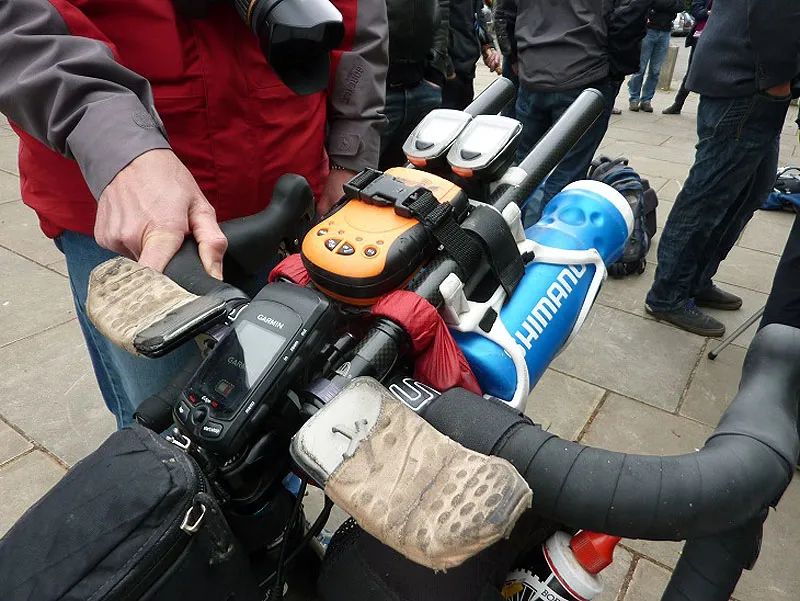
Hall's cockpit was a demonstration in organised chaos
Hall used the same Bontrager saddle as he used in training until his last day in India, at which point he fitted a WTB Laser. The new seat allowed him to fit it with a downwards tilt, which gave him a much more comfortable position on the aero bars.
He weighed the bike just before it was fully loaded with gear, and it tipped the scales at 16kg (he reckons it was closer to 18kg by the time he left London). He carried an extra 3kg through India after a friend had dropped off supplies, but even with this Hall was still travelling relatively light for an unsupported ride around the globe. He believes it was essential if he was to stand any chance of breaking the record.
"There was a guy in New Zealand who asked me what my best bit of kit was, but I had a good case for everything. Everything I had was essential; every bit of kit pulled its weight. If it wasn’t, I’d have thrown it away."
Would he make any changes given his experiences? A more comfortable fork (his 'cross fork was straight and uncompromising) would be the first thing to be added, and he would entertain the idea of hub gears if he could run a belt drive, a choice that worked successfully for former record-holder James Bowthorpe.
He'd also like a frame with more suitable road geometry – the steep seat tube and low saddle meant he was constantly slipping from his perch. He actually gave himself blisters on his hands by pushing himself back onto it.
Around the world in 80 days?
The quirks of the Guinness World Records (GWR) state that 18,000 miles must be covered in one direction, and that transit times aren't taken into account. Going what some might view as 'round the world', around the circumference of the Earth, isn't stipulated in the rules – as long as you travel in one direction, you're free to take whatever route you want. This means you can make it as easy as you want, riding across the easiest terrain and conditions, in the most hospitable countries.
But it's the decision by the GWR not to include transit times that allows riders to really bend the rules. In his near 92-day record, Hall was on the road for 106 days, while Bate cycled for 106 days in his 127-day journey. He believes his time could be beaten, but if someone does it in 90 days but has taken 160 overall, how would this be perceived by the public?
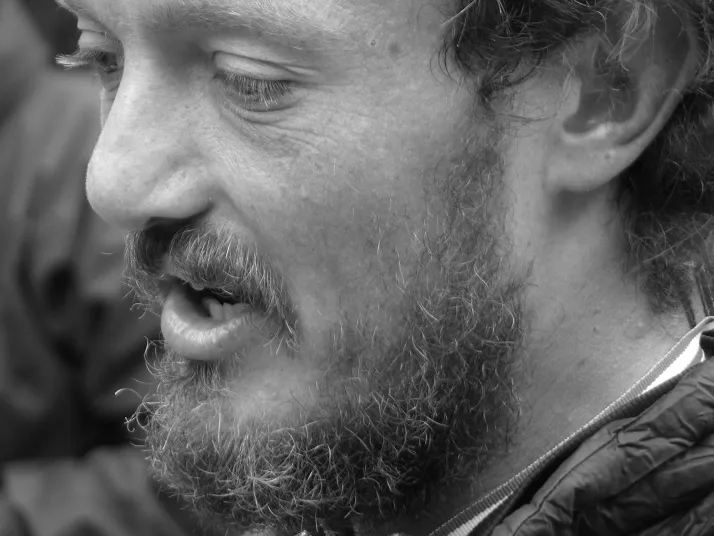
"People are going to go, 'Hang on, you're saying three months but it's taken you almost six months to do?'." You can go quicker [than 91 days] but it's probably by having more rest, so that's the balance you have to get right."
Bigger is better?
The question now is where does Hall go next after breaking an established record by such a margin? For him, the event was always about the race itself. As an experienced endurance mountain biker (he's already taken part in the Tour Divide) the thrill of competition is what gets his juices going. He believes that if there hadn't been others involved in the WCR he might not have gone for it on his own. He says he'd have easily beaten Cox's record, but without other rivals chasing him down he doesn't think he would have found the drive to break Bate's.
"For me, I'd choose to do something more competitive rather than bigger in scale. It's not a given that you'd win racing with the big boys. That means the Tour Divide or Race Across America (RAAM). I wouldn't expect to do well in those, but I'd rather pitch myself against the best than do something bigger in scale."
World weary
Easing back into real life can't be easy after such a monumental physical undertaking. Hall appears to have welcomed the media interest his record's attracted (scores of journalists awaited his return in London last week) but for a man who says he would have been "happy to have a cup of tea and go home", it wasn't the reason he entered the race.
On top of the obvious personal challenge, charity fundraising played a big part in Hall's motivations, as it did for many of the other competitors. With this is mind, he was keen to stress that there are still competitors pounding the pedals in pursuit of London, each with their own goals and dreams.
It's often said that someone who loses with grace is hard to find, but those who win with humility are even rarer.
Mike Hall was participating in WCR in support of Newborns Vietnam, a charity dedicated to reducing neonatal mortality in south-east Asia, particularly Vietnam. If you wish to donate, visit his Just Giving page.
